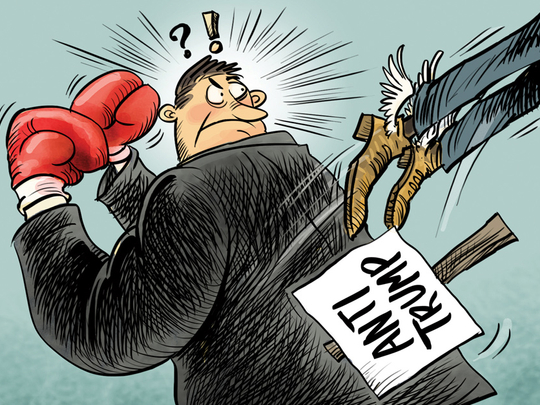
He wants to deport en masse all undocumented immigrants in the United States and to order Muslim citizens to “register”. He has, as a stated plan, a quick repeal of the Affordable Care Act, which covers 23 million people who otherwise would be unable to afford health insurance. And he spurns the idea that he would be there, with his inner circle in the White House, each morning — like other chief executives before him — for the Presidential Daily Briefing, a run-through of the most important intelligence from around the world, because, as he put it, much in the manner of a pouting teenager: “I’m, like, a smart person, I don’t need to be told the same thing and the same words every single day for the next eight years.”
And, Oh, yes, he chooses for the next ambassador to Israel a former bankruptcy attorney who is an ardent supporter of that entity’s colonisation project in Palestine, a man who is convinced that Palestinian statehood, freedom and independence are lot of baloney, and who is looking forward to working from a US Embassy relocated to “Israel’s eternal capital, [occupied] Jerusalem”, thus upending America’s long-held Middle East policy.
And that’s to cite but a few of US President-elect Donald Trump’s impetuous excesses.
The incoming president of the US is like a man driving at 100 miles per hour towards a brick wall, and he has no brakes — a disaster for America and, not so incidentally, for the rest of the world, given the country’s leading role in the global dialogue of cultures.
Progressive Americans are aware of all that because they are aware that Donald Trump will not change his spots once he sets foot in the Oval Office. Progressive Americans, disdainfully dismissed by Trump supporters as “professional lefties” — not to be confused with their New Left boomer parents in the 1960s — are already on their high horse.
During a formal meeting of the Electoral College in Wisconsin’s statehouse earlier last week, for example, a heckler shouted, “We’re all going to war and die thanks to you”, and in Florida, protesters swarmed the Capitol rotunda, with one hoisting a ‘Trump is too Rusky’ sign. In Washington, a group of millennial activists, known as Millennials for Revolution, plan to open a “movement house” located in the Capitol Hill neighbourhood, close to the White House and Congress, as a base from which to protest, for months to come, Trump’s presidency.
Momouta Ahmad, the founder, said that the group’s goal was to “make sure we hold Trump accountable. It’s our duty he does not succeed at all, because if he succeeds, it’s a message that everything he stood for is OK, that it’s OK to hurt all the people he’s hurt”. The house, which is to be set up by Inauguration Day, after the president-elect would have given his oath of office, will serve, she said, as a “space for the best kind of trouble-makers from around the country”.
The following day, more millennials will descend on the nation’s capital to participate in the Women’s March on Washington, a rally expected to attract hundreds of thousands from virtually every state along the East Coast, whose aim is to protest Trump’s rhetoric during the campaign, rhetoric they view, not altogether unreasonably, as “divisive, racist and misogynistic”. And, well, sister marches will be held simultaneously in other major cities to accommodate those who cannot attend the main rally.
It will be recalled that almost immediately after Trump was declared victor in the general election last month, large protests erupted all across the US, including New York, Boston, Chicago, Portland (Oregon) and Oakland (California), with thousands of participants chanting the by now well-known slogan, “Not my president”.
Protests, of course, are a staple of American political culture: From the Suffrage March in 1913 (it wasn’t until seven years later that women were granted the right to vote) to the historic (no other word will do here) March on Washington for Jobs and Freedom in 1963, attended by 250,000, where Martin Luther King gave his iconic “I have a dream” speech from the steps of the Lincoln Memorial; and from the March on the Pentagon in 1967 that brought around 100,000 activists together to protest the Vietnam War, to the rally on the Mall in January 2003 held to oppose a war with Iraq, which the Park Police at the time estimated was attended by 200,000 protesters. But having been there myself, I can attest that it exceeded twice that figure — a figure that included a five-year-old protester, fast asleep on his father’s shoulder, but still precariously clutching on to a sign reading, ‘I don’t want Iraqi children killed’.
Sometimes, especially now, as Americans feel frightened by what a Trump presidency might mean, people feel that the way open to participation in politics is not confined to casting a ballot. The power of peaceful protest — guaranteed to every American by the First Amendment — is another means of making a difference, of meeting other like-minded people, of creating connections in a public space where the sound of people’s voices, people’s objections, is heard — a place where you feel, if only momentarily, a sense of group ecstasy.
Among protesters who rallied against Trump in recent weeks are some who remain shell-shocked. One of them is Jim Crococamo, a middle-aged, middle-class, middle-brow, middle-American — a regular Joe, as it were, new to taking to the streets in order to sound off — who joined protesters marching in New York from Union Station to Trump Tower, soon after election night, and who held a now meme-famous cardboard sign expressing his, shall we say, shock and awe at the election results, that engagingly proclaimed: ‘Not usually a sign guy, but Geez!’
Geez, indeed.
— Fawaz Turki is a journalist, lecturer and author based in Washington. He is the author of The Disinherited: Journal of a Palestinian Exile












